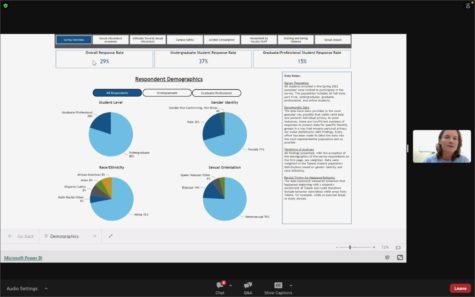Tulane releases 2022 climate survey results
April 14, 2023

Content Warning: This article includes statistics relating to sexual violence, including sexual violence perpetrated against minors, drug- and alcohol-facilitated sexual assault, sexual harassment and detailed descriptions of sexual assault and rape. The article also includes statistics relating to domestic violence and stalking. Please read with care.
Five years since the release of the last sexual misconduct climate survey’s results and three weeks before the end of the semester, Tulane University unveiled the results from the 2022 survey in a moderated webinar on April 11.
The Administrator Researcher Campus Climate Collaborative — ARC3 — survey “is designed to measure campus climate regarding sexual harassment and sexual violence,” according to Tulane’s Climate Survey website.
Tulane administrators addressed 2022 statistics by introducing a new interactive data tool, listing administrative initiatives, outlining the administration’s priorities when examining findings and responding to attendant questions.
This year, Tulane polled from a wider demographic, making both online and part time students eligible to respond in the survey “to take in as many experiences as possible,” according to Dusty Porter, vice president of student affairs. The survey received an overall response rate of 29%, considerably lower than the 47% response rate of the 2017 survey.
24% of all undergraduate women polled in the 2017 survey indicated they were a victim of rape during their time at Tulane. In the 2022 findings, 30% of all undergraduate, female-identifying respondents experienced rape at Tulane. Under Louisiana law, rape is defined as any “act of anal, oral or vaginal sexual intercourse with a male or female person committed without the person’s lawful consent.”
Before releasing data, Porter outlined the six main elements prioritized for evaluation, the first of which involved identifying “outstanding victimization rates of sexual harrassment, stalking, dating, domestic violence, unwanted sexual contact, and/or rape.”
The administration’s second priority was to gather data on high-risk communities; the 2022 results revealed that first-year female-identifying students, students of color and LGBTQ-identifying students remain most vulnerable to victimization.
Thirdly, the administration will utilize survey findings to evaluate the connection between “incidences of victimization and alcohol use, attitudes of sexual violence, campus organizational membership and prior victimization,” Porter said.
The fourth priority aims to update the administration on the level of student awareness and efficacy relating to reporting and support resources.
The fifth priority is to assess student perceptions on university resources, as well feedback on their effectiveness.
Lastly, Porter said the findings will measure student knowledge and “use of positive bystander behaviors.”
The 2017 climate survey results revealed 41% of all undergraduate women and 18% of all undergraduate men experience some form of sexual assault since their arrival on campus.
Tulane’s 2017 climate survey defines sexual assault as “nonconsensual sexual activity committed through incapacitation — taking advantage of a victim too drunk to stop what was happening — or force — through physical force such as holding or pinning down or through threats to physically harm the victim or someone close to them.” According to the Department of Justice, sexual assault refers to “any nonconsensual sexual act proscribed by Federal, tribal or State law, including when the victim lacks capacity to consent.”
Composed of eight key findings, the 2022 climate survey collected further data on student experiences of sexual misconduct prior to their enrollment at Tulane.
One in three female-identifying Tulane undergraduate students answered “yes” when asked if raped between the ages of 14 to 18. According to 2022 data, this statistic is nearly identical to the on-campus statistic.
Members from Tulane’s LGBQ+, non-binary community reported a similar sexual assault statistic; 31% of respondents experienced rape between the ages of 14 and 18. Since attending Tulane, 20% of all undergraduate, LBGQ+, non-binary students reported assault.
As for male-identifying undergraduate students, 9% reported they experienced rape between the ages of 14 and 18. Since enrollment, 11% of male-identifying respondents experienced rape.
Jennifer Hunt, associate director of The Well for Health Promotion, provided a demonstration of the database which allows users to break down statistics based on student level, gender identity, race/ethnicity and sexual orientation.
Hunt then discussed sexual violence prevention steps, focusing on three distinct levels of community intervention: primary, secondary and tertiary. After releasing data from the 2017 climate survey, Tulane established the All In 1.0 plan, to “provide a vision and plan forward for entrenching and expanding sexual violence prevention work … on Tulane’s campus,” according to the All In website. The launch of All In 2.0 plan will “[build] off the first.”
To conclude the session, administrators participated in a moderated Q&A.
Kevin Swartout, professor of psychology at Georgia State University and ARC3 researcher, has worked on several different college climate surveys and helped organize Tulane’s data.
When asked if Tulane has a greater number of incidents or sexual misconduct, Swartout referred to the comparison data available, disclosing relatively low rates of sexual harrassment, average rates of stalking and dating violence and relatively higher rates of rape and online sexual contact.
Experts from the Title IX and Student Affairs Office, along with Swartout, hosted two in-person meet and greets on the Uptown and Downtown campuses. According to the Climate Survey website, “two lunch and learns will be offered the week of April 17 to learn more about the All In 2.0 plan.”
Individuals are able to access the interactive 2022 data tool here: https://allin.tulane.edu/climate-assessment/interactive-data-tool-2022.






















Leave a Comment